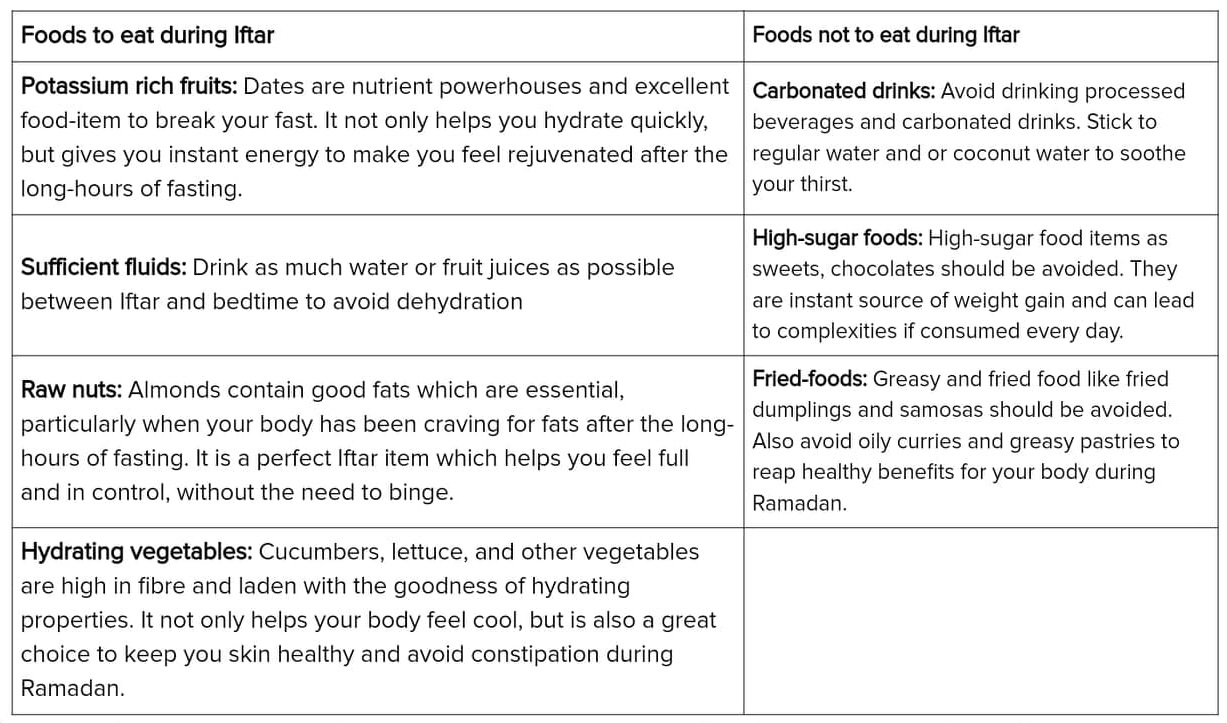Today we will talk about How to Lose Weight During Ramadan. The blessed month of Ramadan is nothing short of festivity for the Muslims around the globe. This is the reason why it is taken in such a stride where food becomes a huge part of the celebration. As much as the main focus of Ramadan is on attaining the nearness of The Creator, another focal point also becomes the two main meals which everyone indulges in during the entire month; Suhoor and Iftar. In general, festivity is closely related to food that is consumed, this is the reason, every household has a set of dishes and food items which are eaten during Ramadan and the family members put an extra effort into making them from scratch.
As much as the month of Ramadan brings happiness, peace and joy with it, many a times it is forgotten that the celebratory part is not something that should dominate the span of 30 days. The main reason for approaching Ramadan should be related to the practice of religion and doing as much as one could to make the most of the spiritual prosperity this month has to offer and is basically designed for. Fasting from the dawn till the sunset is a way to teach the Muslims humility, it also brings in the factor of gratefulness and allows one to be thankful for all the things they might be taking for granted. Spending the day without food allows one tho feel the pain of the less fortunate and underprivileged people of the society. It encourages one to do more charity in order to share what Allah has blessed them with.
Ramadan is not only a test of faith and patience, it is also a test for those who want to stay on track and be healthy throughout the entire month. With all the delicious food that is made throughout the month of Ramadan, it becomes very difficult for the weight-watchers to make healthy choices. Fasting has been proven to improve the mental and physical health, if approached in the right manner. A lot of times, people feel concerned that they might put on the weight because they find it hard to give up on the habitual eating that they are used to for years.
Here are the 10 tips that can help you lose weight during the month of Ramadan:
1 Keeping Your Body Hydrated 2 Having A Balanced Iftar 3 Avoiding Fried Food Items 4 Not Skipping Suhoor 5 Skipping Processed Sugar at Iftar 6 Limiting Salt In-take During Suhoor 7 Planning A 30-Minute Workout 8 Portion Control and Calorie Count 9 Foods To Eat & Avoid During Suhoor 10 Foods To Eat & Avoid During Iftar
Keeping Your Body Hydrated
Hydration is the most important factor when it comes to weight loss. With or without Ramadan, all the dieticians around the world emphasize on how important it is to keep the body hydrated to aggravate the weight loss process. It might seem impossible at first considering the long hours of fasting but if broken down properly, it is very easy to meet the water in-take criteria for the weight loss. Drinking 2 litres of water per day will suffice throughout the month of Ramadan and it will not only help with the detoxification of the body but will also keep the cravings at bay.
2 liters of water make upto almost 8 glasses. In order to break down the water in-take, the easiest way is to drink 2 glasses at Iftar. It is also recommended to break your fast with water because that is the time when the body needs it the most and it helps with the digestion of the food that is eaten immediately after. Continue to drink 4 glasses of water in the time between Iftaar and Suhoor. 1 glass per hour is achievable and easy to take. The remaining 2 glasses of water should be consumed at Suhoor. The extra beverages such as fizzy and caffeinated drinks do not count as water in-take, so one should be mindful with what sort of fluid is being taken during the non-fasting hours.

Having A Balanced Iftar
In Ramadan the metabolism slows down therefore the energy needs of the body are automatically decreased. The Iftaar meal should not make up for all those hours of fasting which were spent without food. The mistake one makes during Iftar is that a lot of food is consumed, in big portions and large variety, which over-fills the stomach and makes the digestion process slow and difficult. While approaching Iftar, think of it as a regular dinner meal that you eat the rest of the year. After breaking the fast, don’t indulge in the food in one-go, instead, take a break, offer your prayers, wait for a few minutes and then resume the meal. It will give you a perspective of how much more food you actually need and if you start feeling satisfied, you will know now is the time to stop.
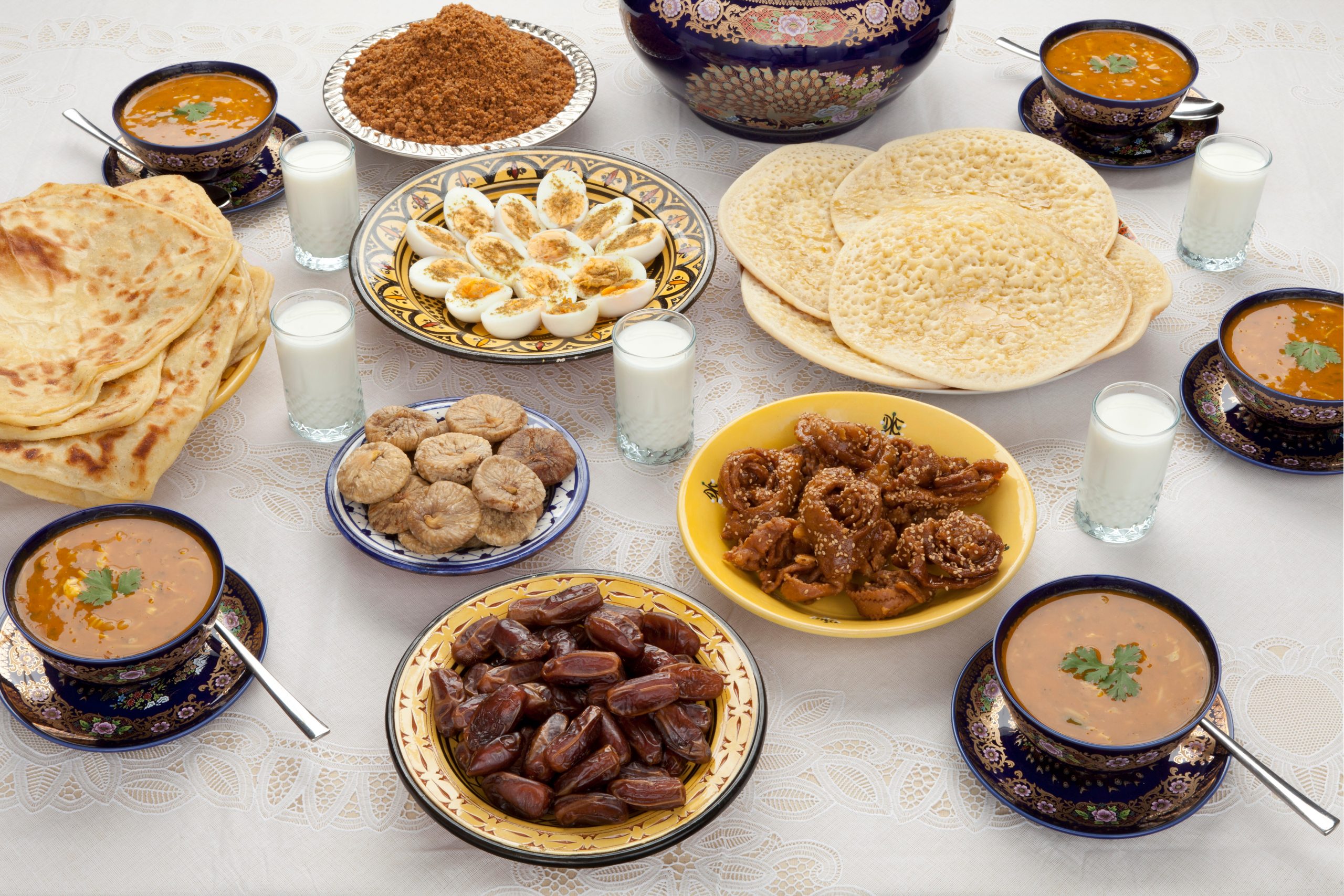
Avoiding Fried Food Items
This is one factor which turns out to be the reason behind all the weight gain during the month of Ramadan. For years and years, people get away with eating fried food items during their early teens and 20’s but when the age factor plays its part and the metabolism slows down, that is when the weight gain occurs. Fried food items are high in calories and low in nutrition. They might be super tasty but one should be extra cautious while consuming them during Ramadan because the only thing they aid the body is with the weight gain. There are many healthier options that one should go for instead of going the typical route of Ramadan special fried food items. Over the years, a lot of research has been done which proves the health hazard that fried food items are. They surpass the daily calorie in-take recommended for an average individual’s diet and when the time comes for the actual and regular meals, they are counted as over-eating because the body has already met its daily calorie intake limit.

Not Skipping Suhoor
In Ramadan Suhoor takes the place of a breakfast. Breakfast happens to be the most important meal because it not only kick starts the day but also gives the body the energy it needs to get going. Skipping Suhoor is a risky choice because you will tend to get hungrier throughout the day which will result in overeating at Iftar and that is something that has to be avoided to continue with the weight loss journey.
Skipping Processed Sugar at Iftar
Another biggest reason for the weight gain during Ramadan happens to be the sugar that is consumed throughout the month from the beverages and sweets which are laden with sugar. The best thing to do is to avoid processed sugar because that is the last thing you need in your body if you are aiming to lose weight or not gain the extra pounds during Ramadan. Sugar can always be substituted by consuming the food items which are rich in naturally occuring sugars such as fruits, dried fruits and honey. A good bowl of fruit salad will not only keep you fuller but will make up a hearty meal which will do good to your body and not cause any weight gain.

Limiting Salt In-take During Suhoor
Sodium tends to dehydrate the body, therefore the best option is to avoid eating such food which has a considerable amount of salt in it. They will tend to make you thirsty and also impact the body’s ability to digest and absorb the fluids.
Planning A 30-Minute Workout
In Ramadan, one feels overwhelmed to adjust to the new routine. A lack of proper sleeping stretch also tends to take a toll on the mind and body. Therefore it is very important to go for some sort of physical activity like brisk walking or simple exercises which will keep the body active and will prevent it from becoming too fatigued or lazy. In Ramadan, it is very easy to feel lethargic and find excuses for not indulging in physical activity but it becomes very important especially when weight loss is the goal. After Taraweeh prayers and before Suhoor, there is enough time frame to find 30 minutes for a basic workout. This much is enough physical activity for the day but it should also be kept in consideration that heat and sun is avoided and while fasting, the workout should not be done.
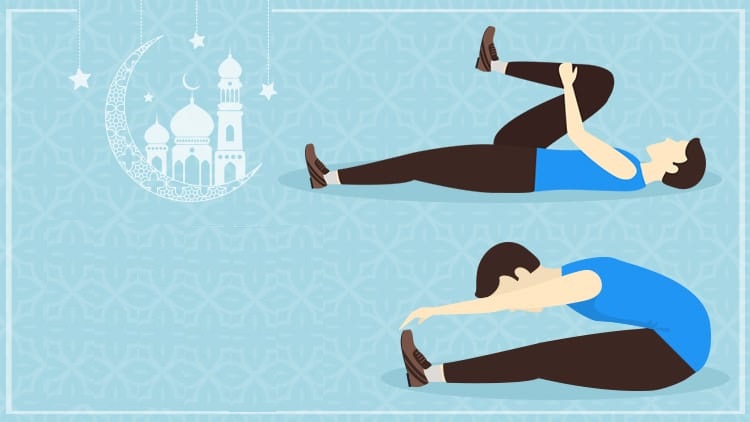
Portion Control and Calorie Count
Portion control is of utmost importance in Ramadan. The essence of this month is to practice patience and self-control, therefore when it comes to food, these two factors should be also kept into consideration. Not eating meals between Suhoor and Iftaar and then going overboard with the eating and indulgence is not in line with what Ramadan teaches. Portion control is the best way to make sure that the numbers on the scale do not increase by the end of the month. Eating in smaller portions is always the right idea and also helps one understand how much the body needs.
Calorie counting is one thing that is always under consideration and at the back of the mind of weight-watchers. Out of all the months, Ramadan happens to be that time of the year where one should be extra conscious and mindful of what is being consumed. All those foods which are fattening in nature should be completely avoided and such food items should be eaten which are not too high in calories and constitute a healthy, fulfilling meal.
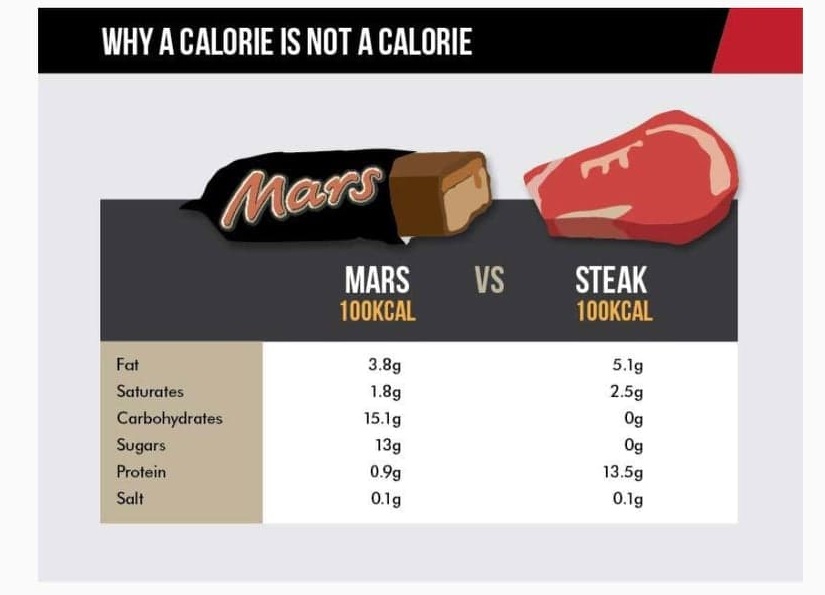
Foods To Eat & Avoid During Suhoor
As mentioned earlier, Suhoor is one of the most important meals in the whole Ramadan. It should be well-balanced and designed in such a way which keeps you full and provides the body with the energy for the longer hours. It is very important to pay special attention to the food that is being eaten during Suhoor. Here is the list of food items that should be taken and avoided during Suhoor.
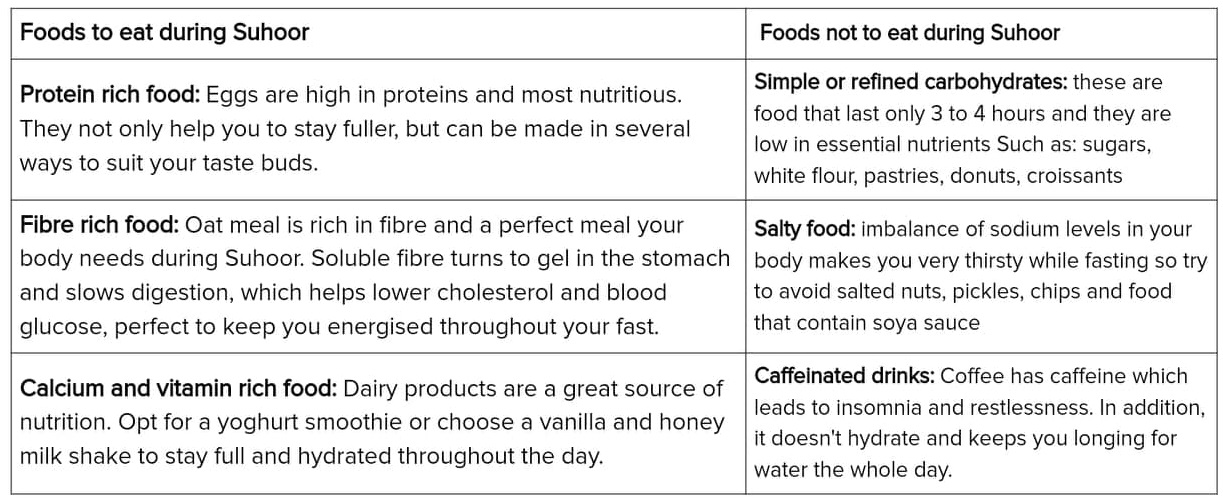
Foods To Eat & Avoid During Iftar
After Suhoor, Iftar becomes another important meal of the day. As much as Iftar is the most awaited meal to break the fast, it should be prepared carefully keeping the calories and portions in the mind. It should have a variety of food categories such as protein, fruits and vegetables to meet the needs of your body. Here is the list of food items that should be taken and avoided during Iftar.
